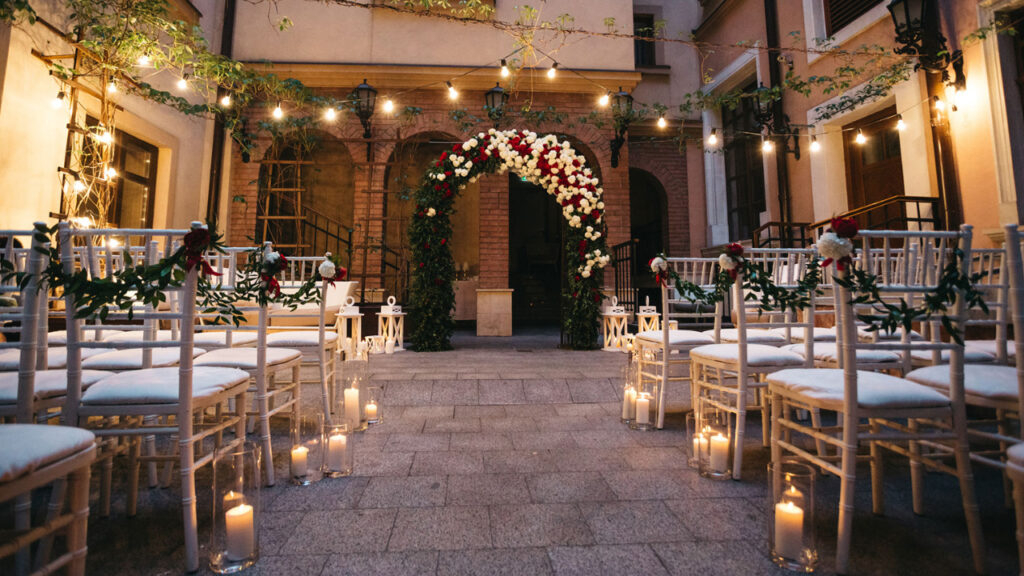A destination wedding in Europe sounds like a fairytale come to life: exchanging vows in a historic castle, dancing the night away in an Italian villa or saying ‘I do’ on a picturesque Grecian coastline. However, many couples can be caught off guard by unforeseen expenses. Being informed is the first step to budget wisely. In this guide, we’ll delve into the hidden costs you might encounter when planning a destination wedding in Europe.
▶️ Read also: How to budget for a destination wedding in Europe (11 steps)
VAT and local taxes
One of the most overlooked aspects when planning a destination wedding in Europe is the Value Added Tax (VAT). It’s essential to consider this when budgeting, as it can have a significant impact on your overall costs.
VAT is a consumption tax applied to the value added to goods and services at each stage of production or distribution. Across European countries, VAT can vary quite substantially, and sometimes, different services or products might even be taxed at different rates within the same country.
Here are some more detailed examples of VAT in various European countries:
- France: The standard VAT rate in France is 20%. However, if you decide to hire a live band from Paris or order wine for your celebration from a local vineyard in Bordeaux, you could be charged this rate on top of the service or product price.
- Italy: Italy boasts a standard VAT rate of 22%. Imagine booking a historical venue in Tuscany. If the venue costs €10,000, you might end up paying an additional €2,200 just in VAT.
- Spain: With a standard VAT rate of 21%, Spain is slightly lower than Italy but still considerable. Should you wish for a beachfront wedding in Costa del Sol and hire local vendors, the VAT could add up quickly.
- Germany: At 19%, Germany’s VAT is on the lower end compared to some other European countries. Yet, if you’re dreaming of a grand celebration in a Bavarian castle, remember to account for this nearly 20% increase on most of your bills.
- Hungary: As a curveball, Hungary has one of the highest VAT rates in Europe at 27%. If Budapest’s charm is your pick, be prepared for a higher tax bill.
💡 Tips:
- Inclusive or Exclusive: Always ask vendors if their quoted prices include VAT. Some might list prices exclusive of VAT to appear more competitive at first glance.
- Varying Rates: Be aware that reduced VAT rates might apply to specific goods and services, depending on the country. For example, books, pharmaceutical products, or even hotel accommodations might have a lower rate than the standard one.
Shipping and import duties
If you’re planning on bringing decorations, gifts, or attire from home, remember there will be shipping costs and potentially import duties.
Example: Sending wedding favours to your Italian venue might seem a good idea until you’re faced with customs duties and extended delivery times.
Unexpected venue charges
When choosing the ideal European wedding venue, it’s not just the aesthetic appeal you should consider. Beyond the basic rental fees lie a plethora of potential hidden charges. Some venues may have utility costs, like electricity and water, based on actual consumption on the event day. If you opt to bring your own alcohol, a corkage fee might be levied.
Often, venues have preferred suppliers and might impose additional fees for outside vendors. Prolonging your celebration beyond the stipulated time can result in overtime charges. While the venue might look pristine for your big day, the post-event cleaning fees could be charged separately. Furthermore, setting up and breaking down the venue decor might be on you, possibly requiring you to hire extra hands.
Lastly, many venues require a security deposit, ensuring they’re covered for any potential damages. It’s crucial to maintain open communication with venue representatives, thoroughly scrutinise contracts, and always be prepared to negotiate to avoid these unforeseen expenses and ensure a seamless experience.
💡 Tips:
- Thoroughly read the venue’s contract. Ensure that every detail, including potential additional fees, is laid out in your contract. This avoids unpleasant surprises later on
- Inquire about any hidden or extra charges beforehand. Always discuss potential hidden charges with the venue coordinator or manager upfront. And negotiate!

Marriage legalities and paperwork
Every country has its marriage laws. In some European destinations, you might need to reside in the country for a certain period before getting legally married. This might involve costs like translations of official documents, notary fees, or even legal consultations.
For more information, have a look at our « Legal advice » section.
Exchange rates and transaction fees
Currency fluctuations can impact your budget. While paying vendors, always be wary of the current exchange rate. Moreover, international bank transfers can incur additional fees.
▶️ Read also: How exchange rates could affect your European wedding budget
Travel for trial visits
You might want to visit your destination a couple of times before the wedding: tasting the menu, checking the venue, and perhaps a trial with the hair and makeup artist. Each of these trips will add to your budget.
7. Off-peak and peak season rates
Organising a destination wedding in Europe means being mindful of the fluctuations in rates depending on the time of year. Europe sees a heavy influx of tourists during its peak seasons, which can substantially impact the costs of nearly every aspect of your wedding.
Peak season typically aligns with the summer months, when the weather is most favourable, and tourists flock to experience the beauty Europe offers. During this time, you can expect heightened prices for venues, accommodations, and flights, as demand is at its zenith.
▶️ Read also: Why a wedding in the European off-season can save you money
Local transportation
Ensuring smooth local transportation is pivotal when planning a destination wedding in Europe. It’s not just about getting yourself and your guests to the country but also about moving within the destination, especially if events are spread across multiple locations.
For instance, if you’re hosting a wedding in the picturesque countryside of Provence, France, your guests might fly into Marseille or Nice. From there, they would need to traverse the rolling landscapes to get to a remote château or vineyard. Hiring coaches or minibuses becomes essential for such journeys, ensuring guests arrive comfortably and on time.
▶️ Read also: Transport and logistics for a European wedding
Communication costs
Frequent international calls to vendors or potential extra data usage can add up over time. Consider international call packages or VoIP services like Skype or WhatsApp.
Insurances (wedding, travel…)
Lastly, when orchestrating a destination wedding in Europe, insurances play a crucial yet often underrated role. Insuring various aspects of your wedding can serve as a financial safety net, shielding you from unforeseen hiccups and mishaps.
Wedding Insurance: This primarily covers event-specific disruptions. Imagine the venue you booked suddenly goes out of business or an unexpected storm prevents most of your guests from arriving. Wedding insurance can help recoup some of these unforeseen losses. It may also cover vendor no-shows, damaged or lost attire, and even potential liability in case of accidents at the venue.
Travel Insurance: Given you and many of your guests will be travelling internationally, travel insurance is indispensable. It typically covers trip cancellations, delays, lost baggage, and medical emergencies. Should a significant number of guests face travel delays or if there’s an unexpected illness while abroad, having travel insurance can be a lifesaver.
Vendor-specific Insurance: Some couples also opt for insurances specific to certain vendors. For instance, if you’re shipping a custom-made wedding dress from another country, insuring it against damage or loss during transit could be wise.
While a destination wedding in Europe promises romance and memories to cherish, being aware of hidden costs ensures that you avoid unexpected financial surprises. Always do thorough research, communicate openly with vendors about costs, and consider consulting a local wedding planner familiar with the nuances of the chosen country.






